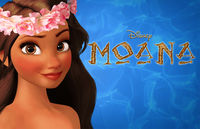“Moana“
Narrative, Disney, and Moana: A Review
Walt Disney, 1 hour and 53 minutes
Brad Allenby, LSI Faculty Fellow
The first question, of course, is why a blog dedicated to the legal, ethical, and cultural dimensions of emerging technologies is running a review of the latest Walt Disney movie length cartoon. Seriously?
It must have something to do with the cultural sensitivity of monetizing folk tales from around the world? Actually, no. Let others pontificate on that one.
Then it must be because the media technology so evident in this film, combined with advances in AI and VR, promises to generate major and unpredictable psychological, economic, institutional and social change? Actually, no, although such thoughts no doubt will occur to any reasonable observer, and it’s a legitimate and very interesting question.
It is, rather, because the movie is a remarkable example of something that we moderns have apparently forgotten: the appeal of narrative that is not based on anger, angst, and fear. The world, after all, is increasingly characterized by dueling, indeed even weaponized, narratives – stories and cultural myths designed to exploit and feed powerful and mostly negative emotions in order to bind us into small communities united internally by belief, no matter how naïve or post-factual, and externally by fierce opposition to all those who don’t believe exactly as we do. And we increasingly no longer bother with the pretense of rational conversation to overcome divides, but lapse back into moral outrage: those who don’t share our views are not just mistaken or wrong – they are evil. And you don’t compromise or negotiate with evil. Virtually all the narratives in this growing pantheon are dystopian and aggressively strive to stoke the most powerful negative emotions, fear and anger. As a result, the world grows darker: the idea of progress is increasingly seen as a fantasy (despite plenty of evidence that life is getting much, much better for many more people), and the world is a brutal, zero sum game between good and evil. And then you die.
But Disney creates a different world. The narrative of Moana, like many human myths, is full of conflict and challenge, but in the end is unabashedly optimistic, positive and uplifting. It is a morality play that assumes that humans can be good, and can achieve good things. Equally important and remarkable, it does this without needing to denigrate someone else: there is no Other. This is not a story of one tribe demonizing and killing another; it is not a story of Brexit or the American election or the rise of the Alt-right across the West or Russian disinformation and hybrid warfare. Rather, it is a story of a demi-god who made a mistake, and, of course, a Disney heroine. It does not feed tribalism; it feeds a sense of common humanity. And it does so in a way that rises head and shoulders above the usual run of simplistic, poorly crafted, and mostly idiotic vapidity that passes for kid media these days.
Kudos to Disney on this one. The movie itself is done well and fun. It has great music. The story is neat. It’s a great way to spend two hours. The only people who may not like it are those who are so sunk in cynicism and snark that they appreciate nothing above their own false pseudo-intellectual pretensions, and their ability to drag others down with them.
So: Great film. Great narrative. Good music. Grade: A.
















